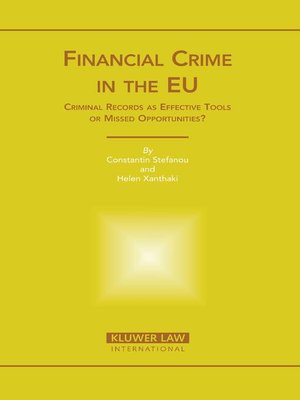Financial Crime in the EU
ebook ∣ Criminal Records as Effective Tools or Missed Opportunities?
By Constantin Stefanou

Sign up to save your library
With an OverDrive account, you can save your favorite libraries for at-a-glance information about availability. Find out more about OverDrive accounts.
Find this title in Libby, the library reading app by OverDrive.



Search for a digital library with this title
Title found at these libraries:
| Library Name | Distance |
|---|---|
| Loading... |
There is little doubt that a series of EU Directives on money laundering and on public procurement have not reduced the incidence of financial crime in public contracts, in banking transactions, or in dealings among the "vulnerable" professions (mainly accountants, lawyers, and notaries). It is the convincingly argued thesis of this book that this failure stems directly from the dependence of these EU Directives on national laws on criminal records. Harmonisation of these laws, the book demonstrates, is not only necessary but urgent.
In eighteen incisive essays, leading European authorities in the field provide in-depth discussion of such elements of the subject as methodologies for collecting criminal records, the authorities maintaining such records, the contents of such records and who has access to them, and conflicts with human rights and privacy legislation. The authors show that these factors and others vary enormously from country to country. They recommend EU initiatives that clearly mandate such specifications as the following:
Standing as it does at a pressure point where criminal law collides with human rights on the one hand and public contracts on the other, this seminal work has a great deal to offer interested parties in several diverse fields of law and administration. The findings and recommendations of its authors are sure to evoke debate across a broad spectrum of academic, professional, and policymaking endeavour.







